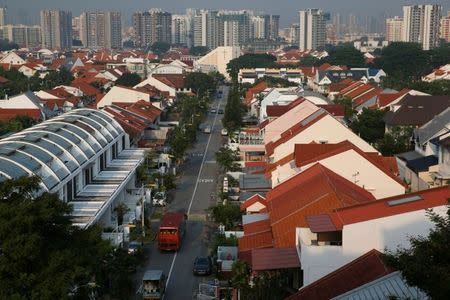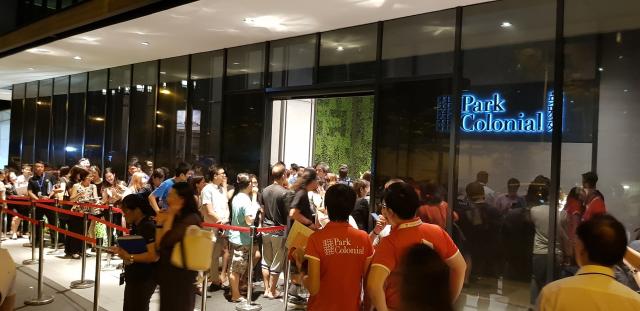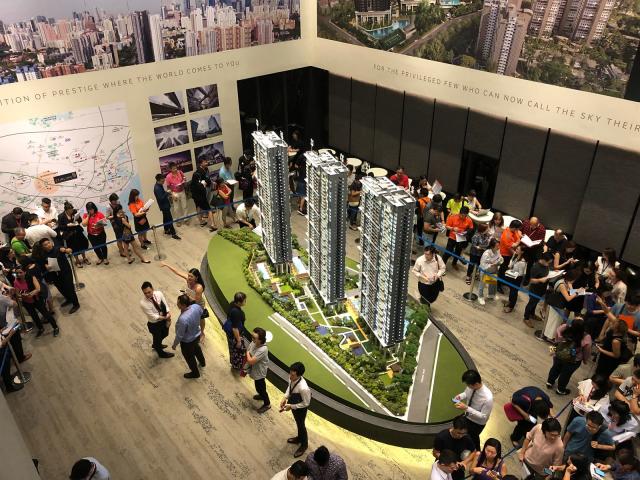‘No rationale’ for tough property cooling measures: Redas
By JANICE LIM
 TODAY file photoVisitors at the Stirling Residences showflat on the evening the Government announced the increase in Additional Buyer's Stamp Duty (ABSD) rates and tightened Loan-to-Value (LTV) limits to cool the property market, July 5, 2018.
TODAY file photoVisitors at the Stirling Residences showflat on the evening the Government announced the increase in Additional Buyer's Stamp Duty (ABSD) rates and tightened Loan-to-Value (LTV) limits to cool the property market, July 5, 2018.
Published06 JULY, 2018
UPDATED 06 JULY, 2018
On Thursday, the Government raised Additional Buyer's Stamp Duty (ABSD) rates and tightened the Loan-to-Value (LTV) limits for Singapore citizens, permanent residents, and foreigners in a bid to "cool the property market and keep prices in line with economic fundamentals".
Describing these measures as "tough", Redas pointed out that the property market is "in the early stages of a recovery and the recovery is in line with economic fundamentals".
The market should be given time "to find its own course and reach a sustained equilibrium", Redas said in response to media queries.
ADVERTISEMENT
The ABSD rates will be raised by 5 percentage points for all individuals, and 10 percentage points for entities. An additional ABSD of 5 per cent that is non-remittable will also be introduced for developers buying residential properties for development.
LTV limits will be tightened by 5 percentage points for all housing loans granted by financial institutions. These revised LTV limits do not apply to loans granted by the Housing and Development Board.
REDAS noted that the property market only started improving last year, helped by the overall stronger growth in Singapore's economy. It stressed that sale transaction volume is "not high and within market expectation".
"The existing sizable ABSD and TDSR remain a restraining factor for foreign buyers and Singaporeans. Buyers are still price-sensitive," said Redas, referring to the total debt servicing ratio framework which has remained in place since 2013.
Redas said it also "does not see the rationale" of the additional non-remittable 5 per cent ABSD imposed on developers buying residential properties for development. Developers are already constrained by financial considerations as well as "tough and unfriendly business policies", such as the existing 25 per cent ABSD which licensed developers can request to be remitted only if they manage to sell off all units within the five-year deadline.
"The new ABSD on developers will impose additional pressure on land acquisition as they compress their development, sales and land replenishment cycle time. Developers are concerned of distortionary effects of such market behaviour over the medium and long term," Redas added.
The association said it hopes the Government "maintains the confidence of investors and buyers as well as developers" while managing the property market. "It is in the interest of the country to have a vibrant real estate industry and a steady growth in real estate value for home owners and investors in the long term," Redas said.
By JANICE LIM

Published06 JULY, 2018
UPDATED 06 JULY, 2018
- ? Shares
On Thursday, the Government raised Additional Buyer's Stamp Duty (ABSD) rates and tightened the Loan-to-Value (LTV) limits for Singapore citizens, permanent residents, and foreigners in a bid to "cool the property market and keep prices in line with economic fundamentals".
Describing these measures as "tough", Redas pointed out that the property market is "in the early stages of a recovery and the recovery is in line with economic fundamentals".
The market should be given time "to find its own course and reach a sustained equilibrium", Redas said in response to media queries.
ADVERTISEMENT
The ABSD rates will be raised by 5 percentage points for all individuals, and 10 percentage points for entities. An additional ABSD of 5 per cent that is non-remittable will also be introduced for developers buying residential properties for development.
LTV limits will be tightened by 5 percentage points for all housing loans granted by financial institutions. These revised LTV limits do not apply to loans granted by the Housing and Development Board.
REDAS noted that the property market only started improving last year, helped by the overall stronger growth in Singapore's economy. It stressed that sale transaction volume is "not high and within market expectation".
"The existing sizable ABSD and TDSR remain a restraining factor for foreign buyers and Singaporeans. Buyers are still price-sensitive," said Redas, referring to the total debt servicing ratio framework which has remained in place since 2013.
Redas said it also "does not see the rationale" of the additional non-remittable 5 per cent ABSD imposed on developers buying residential properties for development. Developers are already constrained by financial considerations as well as "tough and unfriendly business policies", such as the existing 25 per cent ABSD which licensed developers can request to be remitted only if they manage to sell off all units within the five-year deadline.
"The new ABSD on developers will impose additional pressure on land acquisition as they compress their development, sales and land replenishment cycle time. Developers are concerned of distortionary effects of such market behaviour over the medium and long term," Redas added.
The association said it hopes the Government "maintains the confidence of investors and buyers as well as developers" while managing the property market. "It is in the interest of the country to have a vibrant real estate industry and a steady growth in real estate value for home owners and investors in the long term," Redas said.




